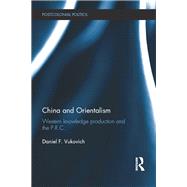- ISBN: 9780415592208 | 0415592208
- Cover: Hardcover
- Copyright: 11/29/2011
This book argues, in short, that there is a new, specifically Sinological form of orientalism at work in the world. This marks a shift within orientalism from a logic of an essential difference between East and West (as in Said's analysis, or classic colonial discourse, a la Kipling), to one of sameness. China ' the West's "China" -- is now seen as caught up in a halting but inevitable process of becoming-the-same as the West: liberal, modern, normal. The shift reflects the transition to an era of increasing globalization, the resurgence of modernization rhetoric within China Studies, the influence of anti-historicist, post-modern thought and of course changes within an ever closer Sino-West relationship since the Nixon-Mao détente and the Dengist turn to capitalism.So too the predominance of the logic of sameness, of a "China" caught up in becoming like "us," reflects capital's force and logic of abstract equivalence. The abstract form of the "China" within this orientalism indexes and in part derives from what Immanuel Wallerstein memorably summarizes as the 'commodification of everything' within the world system and which according to Alfred Sohn-Rethel also includes an increasing abstraction within intellectual labor and thought. This "new" form of orientalism, then, also necessitates critical and scholarly attention to the political-economic dimensions of colonial or oriental discourse ' something that has long been called for within postcolonial studies.ăSinological- orientalism is rooted as much in literature, film and intellectual-political culture as in area studies and Western foreign policy. This is both an American yet truly global orientalism. While it serves a variety of U.S interests and remains rooted in a culture of imperialism, it also circulates globally and is in part produced by texts from across Europe, Australia, India and China itself. Indeed this study shows that self-orientalization, or the internalization of orientalist and occidentalist discourse within China (for these are two sides of the same coin) not only has consequences for postcolonial theory but reveals that our epistemological field has to be global. Its not that the geographic divisions between China/West or Orient/Occident have dissolved or even weakened, but that their meanings and discourses are truly dispersed and global.To show this re-constitution and global dispersion of orientalism I draw on Marxist and post-colonial theory in an inter-disciplinary analysis of several fields. These include Area Studies work on the Mao and reform eras, in particular the Great Leap Forward famine and the Tiananmen protests of 1989; the academic and popular reception of New Chinese cinema, from the Fifth Generation directors (Chen Kaige and Zhang Yimou) on; current theories of globalization and the post-Cold War world order where China often serves as a paradigmatic "example"; and U.S. journalism, fiction and film, including DeLillo's Mao II and Scorsese's Kundun, that represents and offers an historical interpretation of contemporary China.







